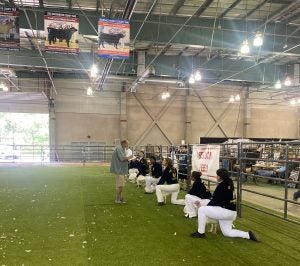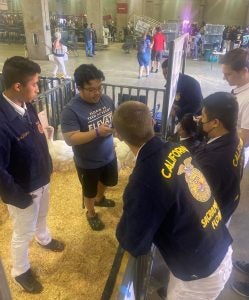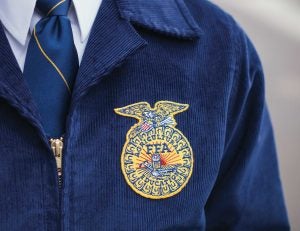The Sacramento County Fair in California. Over a thousand livestock animals walked, waddled, skimpered into the livestock pavilion — each with their own student by their side.
Across the nation each year, hundreds of thousands of students — just like the ones at Sacramento County fair — work long hours for months to ensure their projects are market ready and show ready for the week of the fair. At their side are advisors, parents, and a special group of people. A necessary one. Our FFA alumni.
The second day of the fair, after the pens were prepped, shavings scattered, feed and water filled to the brim, students of the Sacramento-Florin FFA Chapter were ready to practice showmanship. Even though the show wasn’t for a few hours, we decided to practice anyway.

As a brand new turkey advisor, I was secretly nervous to lead this group. I had some practice showing turkeys for three years in high school, along with aiding the poultry project at the high school I currently teach at. But, time and award money was on the line for these students, and I surely didn’t want them to fail due to my ignorance of any step of the process.
Thankfully, a Sacramento-Florin FFA alumni member, Charlie, stood by my side — each of us standing to one side of the bird. Charlie had recently raised turkeys throughout high school and one year out as an alum. Finishing his second year at California State University of Sacramento, his experience was recent. Charlie came to the fair not just to support the students through his experience, but to be a cheerleader for the students ringside.
After giving students a few pointers on showmanship, it was time for flipping the turkey. For those unfamiliar, judges will ask students to flip their turkeys while in the ring so the judge can see how well the breast meat and wings were developed (among other inspections).
When the very last student from our turkey group went to flip their bird, suddenly, the turkey became agitated. While the student held the bird by its shanks, the turkey flapped its wings to and fro and gave out shrieks as if it were in pain.
Immediately, Charlie sprang in toward the turkey. He grabbed its chest and tilted the bird toward him. It slowly stopped flapping its wings. I knelt down next to Charlie to see what he was intensely inspecting. There, below the turkey’s breast, was a significant gash. The turkey began to bleed.
My heart sank.
Here I was. A new turkey advisor, a newly hired agriculture teacher, and was directing a student group who expected for me to know what to do next when I had no idea what to do next.
Then, Charlie picked up his phone to gather advice from others. He began to calmly talk with the students about the injury, soothing the student whose bird was injured. The most helpful part, whether it was unintentional or not, was his ability to distract the students as I collected myself enough to decide what to do next to mend the injury.

Whether 25 years removed, or just graduated a few years prior, FFA alumni like Charlie are irreplaceable. No, each hadn’t saved a student and their advisor from a livestock emergency; even though I’m sure there have been a handful who may have. But, FFA alumni such as Charlie provide their own expertise and support from their years of experience in the jacket that are incredibly helpful to chapters and their students. And they do this for free, oftentimes donating their own space, money, resources, time, tips, and tricks to ensure the current chapter is more successful than they could have ever imagined the chapter being when they were once in the FFA jacket.
The best part is, they once roamed the same department, had almost the same teachers, used the same supplies still housed at the farm or the ag classroom, and know of or come across many of the same people as our current students have, had, or will in the future. Local alumni are more connected to our students than we can ever imagine them being. As FFA advisors, local supporters, administrators, or the like, it’s our job to get our alumni and students connected to provide them with the opportunity to develop relationships that will grow our chapters, alumni groups, and our communities.

Here is the deal. An FFA chapter is consistently doing something right when students are almost equally as supported by their FFA alumni members as their agriculture teachers.
Some of you may agree, having your own memories of when your local FFA alumni were rockstars for your students. Others may need more than my anecdotal justification for why local FFA alumni partnerships are indeed so valuable for our FFA chapters to believe in the program.
Well, if that is you and you are looking for more anecdotes, facts, and/or general information on what, how, and why local FFA alumni partnerships are valuable, I would encourage you to visit the National FFA Alumni and Supporters on the National FFA website. On the website, folks can scroll through stories of other alumni membership, sign up for an official National FFA alumni membership, see upcoming alumni events they may be interested in attending, and get fast information on how local chapters can engage and grow their alumni groups.
Local FFA alumni may not wear the blue and gold anymore, but the success of us all — agriculture teacher and student membership alike — is indebted to the work of our local FFA alumni. Support for them is support for us all. Make sure to view the sources provided above to ensure your local FFA alumni remain a valuable partnership for your chapter.
Bre Holbert is a past National FFA President and studies agriculture science and education at California State-Chico. “Two ears to listen is better than one mouth to speak. Two ears allow us to affirm more people, rather than letting our mouth loose to damage people’s story by speaking on behalf of others.”



